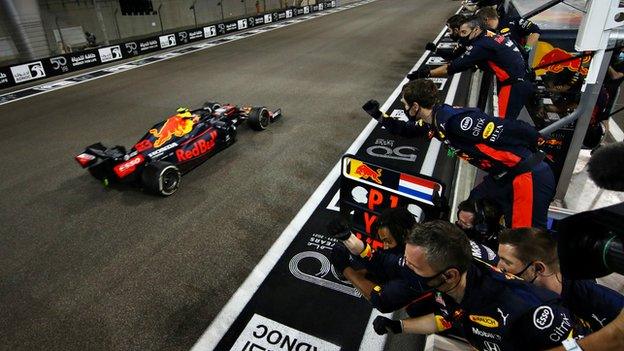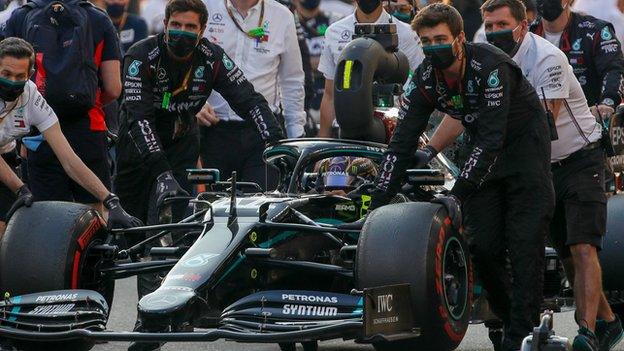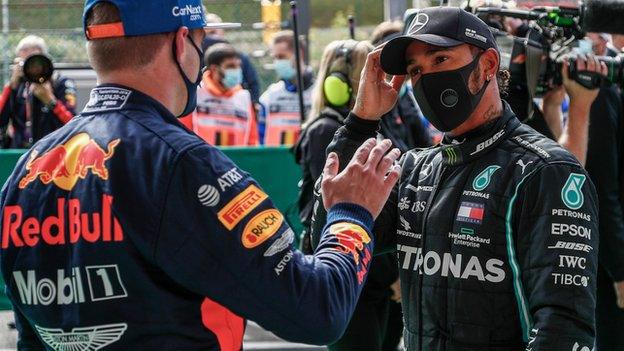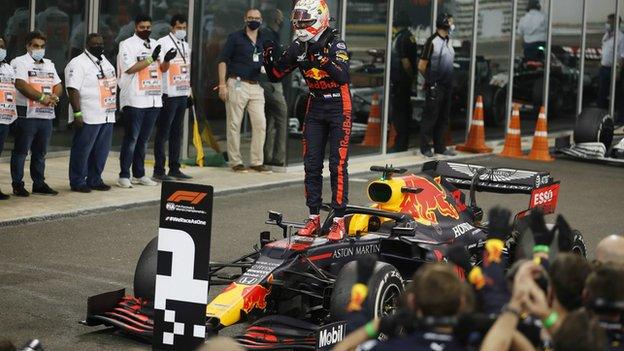Red Bull give Mercedes a 'slap on the wrist' but have no guarantee of success in 2021
- Published

Verstappen acknowledges Red Bull must 'learn from mistakes' in previous seasons if they are to build on Abu Dhabi victory when racing returns in 2021
Max Verstappen's victory in a dreary Formula 1 season finale in Abu Dhabi was the sort of race Red Bull expect of themselves but have only rarely been able to deliver these past seven years.
The Dutchman utterly dominated the race, in a performance that evoked some of the dominant drives of Sebastian Vettel when he was romping to four consecutive world titles with Red Bull at the beginning of this decade.
That, though, was another era. And not just for Vettel, who has appeared a shadow of the driver he was back then in his last three years at Ferrari.
The advent of hybrid engines in 2014 put an end to Red Bull's success and ushered in an unprecedented level of achievement for Mercedes and Lewis Hamilton, to whom all the sport's records have surrendered. Red Bull have had to be satisfied with scraps that have fallen off the table.
There have been moments of promise here and there for Red Bull, but they have been islands in an ocean of silver - and now black.
Recent years have followed a familiar pattern - Red Bull start the season poorly, they make strong progress to the point that they challenge towards the end of the year, only to fall back again over the winter.
Is there any reason to believe 2021 will be any different? Well, maybe.
What happened in Abu Dhabi?
Although Verstappen's victory at Yas Marina appeared to come out of the blue, it was not totally against the run of play. The team have been edging closer to Mercedes for some time now.
Verstappen was pushing Hamilton's team-mate Valtteri Bottas hard for the lead in the first part of the Emilia Romagna Grand Prix at the start of November, albeit the Finn was delayed by a piece of bodywork stuck in his car and disrupting his aerodynamics.
He was looking a potential winner in the slippery conditions in Turkey, with Hamilton still a couple of places behind, when a spin while he was attacking Racing Point's Sergio Perez for second place derailed his afternoon.
Verstappen finished just over a second behind Hamiton in the first Bahrain race, and was just 0.056secs off pole in the second a week later. Red Bull had hopes he could challenge Bottas and Hamilton's stand-in George Russell for victory there, only for Verstappen to crash on the first lap trying to avoid a collision between Ferrari's Charles Leclerc and Perez.
In Abu Dhabi this weekend, the Red Bull was simply a quicker car, and although Hamilton admitted to not being at 100% after his brush with coronavirus, even a healthy Hamilton would not have been able to challenge Verstappen, team and driver agreed.
Mercedes had two main problems. The car "wouldn't turn" in corners Five, Six and Seven, team boss Toto Wolff said, and they were losing 0.3secs a lap just in those three corners. The last sector of the lap - the sequence of corners around the hotel and marina - "wasn't great either," Wolff added.
On top of that, in the last few races Mercedes have become aware of a reliability concern with their MGU-K, the part of the engine's hybrid system that recovers and redeploys energy through the rear axle.

Engine issues and balance problems blighted Mercedes' race
As a result, they were having to run their engines detuned for much of the race. The time loss was not huge - about 0.1secs a lap. But added to the balance problems the car was struggling with, it meant they never had a chance of challenging Verstappen. And even the second Red Bull of Alex Albon was not far behind.
On the Red Bull side, Mercedes engineers noticed a new rear wing on the car, which they suspected had given a handy performance boost.
This was, then, absolutely a win on merit, and for it to come on a track on which Mercedes have won every race since 2014 has given Red Bull a confidence boost going into the winter.
Team boss Christian Horner said: "To beat Mercedes in a straight fight and be the first team to beat Mercedes at this circuit since winning ourselves in 2013 is a great achievement, and it gives the whole team a huge amount of energy as we head into what will be a pretty short winter."
Hamilton expects strong Red Bull in 2021
The stats back up the sense of progress from Red Bull. Over the first half of the season, their average qualifying deficit to Mercedes was 0.843 seconds. This has come down to 0.303secs over the second half of the year.
The big question now is whether Red Bull can maintain this progress over the winter.
For what it's worth, Hamilton thinks they can.
"We have a fight on our hands next year," he said. "Without doubt these guys are going to be strong. This car he [Verstappen] is driving now is next year's car pretty much and same for us, so I am excited for that battle we are going to get."
On one level, Hamilton could be right. It should be easier for Red Bull to continue their momentum into next season than it has been for the last few years because of rule restrictions agreed on cost-saving grounds as a result of the pandemic.
"It is not a start from scratch again," Horner said. "Probably about 60% of the car is carried over to next year - gearbox, chassis, elements of suspension; a large element of the car is fixed. It's mainly aerodynamics that can be altered. Our philosophy has been whatever we learn this year, we carry over into next year."
The realities of a 'car freeze'

Mercedes have won seven of the 10 races since their one-two finish ahead of Verstappen's Red Bull at the Belgian Grand Prix in August, despite freezing development of the car to concentrate on the 2021 design
Mercedes, though, have taken a different approach to 2020. They were so dominant over the first half of the season that they chose to pretty much freeze development after the Belgian Grand Prix at the end of August, preferring to concentrate on their 2021 design.
The reason for this is that they think the rule changes for next year amount to a bigger change than is generally believed.
The mechanical parts of the car are largely fixed, although teams have 'tokens' they can spend on limited areas of development of their choosing. Aerodynamics can be changed in any way they wish. As this is the largest performance differentiator on a Formula 1 car, there is no guarantee that this year's competitive order will be reflected in that at the beginning of 2021.
On top of this, there have been rule changes aimed at cutting downforce. These were introduced to slow the cars down because of concerns that the Pirelli tyres - already under strain this year - would not be able to cope with even higher cornering forces.
To slow the cars down, the rear of the floor has been chopped back. This is a critical downforce-producing area.
Mercedes give short shrift to the idea that the cars next year will be only minor developments of this year's.
BBC Sport asked Mercedes technical director James Allison whether he expected their dominance to continue into 2021. He said: "Don't expect to. Absolutely got our hearts set on trying to.
"It's funny listening to the faith that external commentators have that, sure as falling off a log, this will happen because it's not like it feels internally.
"If I could quote back at you the 'fact' that next year's cars are substantially the same but with different aero. Well, yes and no.
"Actually, you can design an entire new suspension on next year's car. You can spend your allowable tokens on quite considerable upgrades. You could be permitted to put a new gearbox on your new car if you use your permitted development tokens for that, or a new chassis.
"These are not small twiddles to an existing package. They are quite large ones.
"And then this aero discussion, which is passed off as if we are just changing a Gurney flap on a front wing or modifying slightly the camber of a rear wing.
"It is [actually] a root-and-branch commando raid on the current level of performance that needs to be scrambled back if we can."
Allison says the effect of the rule changes this winter is as big as that between 2018 and 2019, when the front wing design was changed, with a significant effect on the performance of the cars.
"It's the back end [this time] but it's every bit as big in its impact and every bit as breathless and frightening in trying to get it all back.
"So it doesn't feel to us like it's a done deal. If we showed up with the first iterations of this modified regulation set, we would go from pole position to more or less last on the grid. So there is a lot of work to do."
'I hope we learn from our mistakes'

'Beating Mercedes at the last race of the season might just have been the worst thing Red Bull could have done'
On top of this, engine suppliers are free to develop their engines this winter - and not only is Red Bull's partner Honda already lagging behind, but they are quitting F1 at the end of next year.
Small wonder, then, that Verstappen is taking nothing for granted.
"I honestly don't want to feel anything at the moment," he said. "We have to work hard to be better and stronger because you can't just rely on this result.
"We know we still have to improve the car a lot. We have some areas to work on, and not only on the car, but also power-wise. We need more.
"I hope we learn from the last few years. It is not like we do it on purpose. We will go into the winter with a good feeling. [Winning in Abu Dhabi] is a good boost and I just hope we learn from our mistakes we made also at the beginning of this year and hopefully we will build a better car for the beginning of next year."
Horner said: "Mercedes have a great strength in depth. Of course we expect them to be very, very strong. But if we can build on this result and this momentum hopefully we can give them a harder time."
The secrets of Mercedes' success these past seven years are not just that they have assembled the greatest team in F1 history, built the best cars and best engines and employed the best driver.
What's even more impressive is how long they have been able to hold that together without complacency creeping in.
Wolff calls this "permanent scepticism" and a "relentless pursuit of excellence".
On Sunday, he described their loss in Abu Dhabi as "a slap on the wrist". In that sense, beating Mercedes in this manner at the last race of the season might just have been the worst thing Red Bull could have done.

Missed out on the weekend's Premier League action? All the goals and highlights are streaming now

